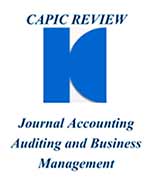Published 2021-11-04
Keywords
- IIRC,
- integrated reporting,
- quality index,
- voluntary information
How to Cite
Abstract
In the last 40 years, the number of independent reports associated with environmental, social and corporate governance issues has increased considerably. At the end of 2013, the Integrated Reporting (IR) conceptual framework was published, which integrates financial and non-financial aspects into a single narrative showing how the organization creates value over time. Through the development of an index based on the International Integrated Reporting Conceptual Framework, this article investigates the factors that motivate the quality of corporate disclosures of integrated reports (IR) in 2018. The index assesses what is being disclosed as integrated information, and what drives the variation in the quality of these reports. Through the analysis of all reports informed. The results suggest a high degree of discretionary disclosures in the information presented. There is incomplete and inaccurate information, which is contrary to the essence of the IRs. It is concluded that the process is not yet institutionalized and, contrary to expectations, it has not stimulated a new integrated disclosure mechanism in Chile. The results obtained in this study are not consistent with what, in theory, an IR is. Care must be taken when evaluating corporate information through a so-called “integrated” report when there is no in-depth analysis of the minimum content required on an IR.
Downloads
References
- Barth, M., Cahan, S., Chen, L., y Venter, E. (2017). The Economic consequences associated with integrated report quality: Capital market and real effects. Accounting, Organizations and Society, 62, 43-64.
- Bernardi, C., y Stark, A. W. (2016). Environmental, social and governance disclosure, integrated reporting, and the accuracy of analyst forecasts. The British Accounting Review.
- Brown, J., y Dillard, J. (2014). Integrated reporting: On the need for broadening out and opening up. Accounting, Auditing & Accountability Journal, 27(7), 1120-1156.
- Dhaliwal, D. S., Li, O. Z., Tsang, A., y Yang, Y. G. (2011). Voluntary nonfinancial disclosure and the cost of equity capital: The initiation of corporate social responsibility reporting. The Accounting Review, 86(1), 59-100.
- Dhaliwal, D. S., Radhakrishnan, S., Tsang, A., y Yang, Y. G. (2012). Nonfinancial disclosure and analyst forecast accuracy: International evidence on corporate social responsibility disclosure. The Accounting Review, 87(3), 723-759.
- Diamond, D. W., y Verrecchia, R. E. (1991). Disclosure, liquidity, and the cost of capital. The Journal of Finance, 46(4), 1325-1359.
- Guidry, R., y Patten, D. (2010). Market reactions to the first‐time issuance of corporate sustainability reports. Evidence that quality matters. Sustainability Accounting, Management and Policy Journal, 1(1), 33-50.
- Herbohn, K., Walker, J., y Loo, H. Y. M. (2014). Corporate social responsibility: The link between sustainability disclosure and sustainability performance. Abacus, 50(4), 422-459.
- Higgins, C., Stubbs, W., y Love, T. (2014). Walking the talk(s): Organisational narratives of integrated reporting. Accounting, Auditing & Accountability Journal, 27(7), 1090-1119.
- IIRC. (2013a). Capitals background paper for IR: International Integrated Reporting Council.
- IIRC. (2013b). The International Framework: International Integrated Reporting Council.
- IIRC. (2013c). The International Framework Released with Business and Investor Support. Retrieved from http://www.theiirc.org/2013/12/09/the-international-ir-framework-released-with-business-and-investor-support/
- IIRC. (2015). Creating value. Integrated reporting and investor benefits: International Integrated Reporting Council.
- Lu, C.-W., y Chueh, T.-S. (2015). Corporate Social Responsibility and Information Asymmetry. Journal of Applied Finance and Banking, 5(3), 105-122.
- Ocean Tomo. (2015). Intellectual capital equity. Retrieved from http://www.oceantomo.com/intellectual-capital-equity/
- Qiu, Y., Shaukat, A., y Tharyan, R. (2016). Environmental and social disclosures: Link with corporate financial performance. The British Accounting Review(0). doi:https://doi.org/10.1016/j.bar.2014.10.007
- Stent, W., y Dowler, T. (2015). Early assessments of the gap between integrated reporting and current corporate reporting. Meditari Accountancy Research, 23(1), 92.
- Stubbs, W., y Higgins, C. (2014). Integrated reporting and internal mechanisms of change. Accounting, Auditing & Accountability Journal, 27(7), 1068-1089.
- Norma de caracter general 385, (2015).
- van Bommel, K. (2014). Towards a legitimate compromise? : An exploration of Integrated Reporting in the Netherlands. Accounting, Auditing & Accountability Journal, 27(7), 1157-1189.
- Verrecchia, R. E. (1990). Information quality and discretionary disclosure. Journal of Accounting and Economics, 12(4), 365-380.
- Zhou, S., Simnett, R., y Green, W. (2017). Does integrated reporting matter to the capital market? Abacus, 53(1), 94-132.
- Zúñiga, F., Pincheira, R., Aguilar, C., y Silva, J. (2020). Informes de sustentabilidad y su auditoría: Efecto en la liquidez de mercado chileno. Estudios Gerenciales, 36(154), 56-65. doi:https://doi.org/10.18046/j.estger.2020.154.3558
- Zúñiga, F., Pincheira, R., Dimter, M., y Quinchel, B. (2021). Reportes integrados y la auditoría no-financiera: Efectos económicos. Working paper. SSRN. Retrieved from http://ssrn.com/abstract=3803195.
- Zúñiga, F., Pincheira, R., Walker, J., y Turner, M. (2020). The effect of integrated reporting quality on market liquidity and analyst forecast errors. Accounting Research Journal, 33(4/5), 635-650.


































